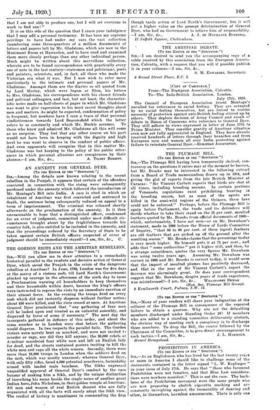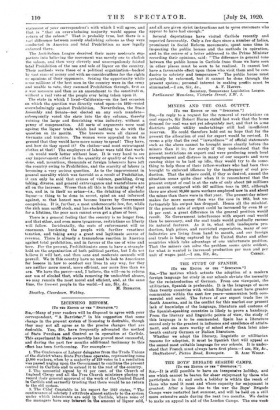PROHIBITION IN AMERICA.
[To THE EDITOR CT TUE " SPECTATOR."] SIR,—As an Englishman who has lived for the last twenty year or more in America I should like to challenge some of the statements contained in the letter signed "L. W. Keplinger " in your issue of July 17th. He says that "those who favoured Prohibition were not fanatics, and that Blue Law considera- tions were nowhere manifest." This is not the case. The back- bone of the Prohibition movement were the same people who are now proposing to abolish cigarette smoking and are constantly inveighing against the immorality of dancing and other, in themselves, harmless amusements. There is only one
statement of your correspondent's with which I will agree, and that is "that an overwhelming majority would oppose the return of the saloon." That is probably true, but there is a vast difference between merely abolishing saloons as they were conducted in America and total Prohibition as now legally enforced there.
The Anti-Saloon League deceived their more moderate sup- porters into believing the movement was merely one to abolish the saloon, and then very cleverly and unscrupulously foisted total Prohibition of the use and sale of liquor on the country. Their methods were those of a political organization—backed by vast sums of money and_ with no considerations for the rights or opinions of their opponents. Seizing the opportunity while some millions of the best men in the country were in the army and unable to vote, they rammed Prohibition through, first as a war measure and then as an amendment to the constituti without a real vote of the people ever being taken upon it. The state in which I lived—California—on the last occasion on which the question was directly voted upon—in 1916—voted overwhelmingly against Prohibition. Nevertheless, the State Assembly and Senate—not elected on any such mandate— subsequently voted the state into the dry column, thereby ruining the large and flourishing wine industry, without a penny of compensation. All sorts of arguments were used against the liquor trade which had nothing to do with the question on its merits. The brewers were all classed as Germans and traitors. The women were appealed to on the ground that they would have more money to spend ! They have, and how do they spend it? On clothes—and most extravagant clothes at that! The employers of labour were told that work- • en would work better without beer. It is very hard to see any improvement either in the quantity or quality of the work done, and, meantime, thousands of foreign labourers have left the country owing to Prohibition, and the scarcity of labour is becoming a very serious question. Ae to the improvement in general morality which was foretold as a result of Prohibition, it can only be said that crimes of violence, gambling, drug taking, divorce, and general extravagance and wastefulness are all on the increase. Worse than all this is the making of what was, and is in itself no crime—i.e., the drinking of alcoholic liquor—a thing to be done in secret, spied on and informed against, so that honest men become knaves by Government compulsion. It is, further, a most undemocratic law, for, while the rich man coula stock, and has stocked his house with liquor for a lifetime, the poor man cannot even get a glass of beer. There is a general feeling that the country is no longer free, and that other, and even more tyrannous, restrictions on liberty will follow. Incidentally, the costs of enforcement will ne enormous, burdening the people with further vexatious taxation, and taking away a great and legitimate source of revenue. There is already a tremendous reaction in America against total prohibition, and in favour of the use of wine and beer. For the present, Prohibitionists seem to have a strangle- hold on the organization of both political parties, but I do unt blieve it will' last, and then sane and moderate counsels will prevail. We in this country have no need to look to Americans for lessons in how to conduct our lives in any way, for they are neither more moral, more efficient, nor more free than we are. We have the power—and, I believe, the will—so to reform our use of alcohol that, while removing its undoubted abuses, we may remain the most moral and efficient, and, at the same time, the free-eat people in the world.—I am, Sir, &c., Stoatley, Cleardown, Woking.
REDMAYNE.



































 Previous page
Previous page